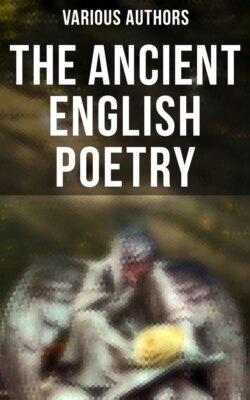Читать книгу The Ancient English Poetry - Various Authors - Страница 54
На сайте Литреса книга снята с продажи.
ОглавлениеII.
THE AGED LOVER RENOUNCETH LOVE.
Table of Contents
The Grave-digger's song in Hamlet, act v. is taken from three stanzas of the following poem, though greatly altered and disguised, as the same were corrupted by the ballad-singers of Shakespeare's time; or perhaps so designed by the poet himself, the better to suit the character of an illiterate clown. The original is preserved among Surrey's Poems, and is attributed to Lord Vaux, by George Gascoigne, who tells us, it "was thought by some to be made upon his death-bed;" a popular error which he laughs at. (See his Epist. to Yong Gent. prefixed to his Posies, 1575, 4to.) It is also ascribed to Lord Vaux in a manuscript copy preserved in the British Museum.786 This Lord was remarkable for his skill in drawing feigned manners, &c. for so I understand an ancient writer. "The Lord Vaux his commendation lyeth chiefly in the facilitie of his meetre, and the aptnesse of his descriptions such as he taketh upon him to make, namely in sundry of his Songs, wherein he showeth the counterfait action very lively and pleasantly." Arte of Eng. Poesie, 1589, p. 51. See another Song by this Poet in vol. ii. No. viii.
[Thomas second Lord Vaux, the author of this poem, was born in the year 1510. He wrote several small pieces of the same character which evince taste and feeling, and his contributions to the Paradise of Dainty Devices exceed in number those of Richard Edwards himself, whose name appears upon the original title-page as the chief author. Lord Vaux was a courtier as well as a poet, and was one of the splendid retinue which attended Wolsey in his embassy, in the 19th Henry VIII., 1527, to the Court of France to negotiate a peace. He took his seat in the House of Lords in the 22nd Henry VIII., and two years afterwards, 1532, waited on the king to Calais and thence to Boulogne. He was rewarded with the Order of the Bath at the Coronation of Anne Boleyn, and was also appointed Captain of the Island of Jersey, which office he surrendered in the 28th Henry VIII.]
I loth that I did love,
In youth that I thought swete,
As time requires: for my behove787 Me thinkes they are not mete.788
My lustes they do me leave,5
My fansies all are fled;789 And tract of time begins to weave Gray heares upon my hed.
For Age with steling steps,
Hath clawde me with his crowch,79079110 And lusty 'Youthe' awaye he leapes,792 As there had bene none such.
My muse doth not delight
Me, as she did before:
My hand and pen are not in plight,15
As they have bene of yore.
For Reason me denies,
'All' youthly idle rime;793 And day by day to me she cries, Leave off these toyes in tyme.20
The wrinkles in my brow,
The furrowes in my face
Say, Limping age will 'lodge' him now,794 Where youth must geve him place.
The harbenger of death,25
To me I se him ride,
The cough, the cold, the gasping breath,
Doth bid me to provide
A pikeax and a spade,
And eke a shrowding shete,79530 A house of clay for to be made For such a guest most mete.
Me thinkes I heare the clarke,
That knoles the carefull knell;796 And bids me leave my 'wearye' warke,79735 Ere nature me compell.
My kepers798 knit the knot, That youth doth laugh to scorne,799 Of me that 'shall bee cleane' forgot,800 As I had 'ne'er' bene borne.80140
Thus must I youth geve up,
Whose badge I long did weare:
To them I yeld the wanton cup,
That better may it beare.
Lo here the bared skull;80245 By whose balde signe I know, That stouping age away shall pull 'What' youthful yeres did sow.803
For Beautie with her band,
These croked cares had wrought,50
And shipped me into the land,
From whence I first was brought.
And ye that bide behinde,
Have ye none other trust:
As ye of claye were cast by kinde,55
So shall ye 'turne' to dust.804
FOOTNOTES:
786. Harl. MSS. num. 1703, § 25. [Called in that MS. "The Image of Death." There is another copy in the Ashmolean Library (MS. Ashm. No. 48.)] The readings gathered from that copy are distinguished here by inverted commas. The text is printed from the "Songs, &c. of the Earl of Surrey and others, 1557, 4to."
787. [behoof.]
788. [meet or fit.]
789. Ver. 6. be, PC. (printed copy in 1557.)
790. [crutch.]
791. V. 10. Crowch perhaps should be clouch, clutch, grasp.
792. Ver. 11. Life away she, PC.
793. V. 18. This, PC.
794. V. 23. So Ed. 1583 'tis hedge in Ed. 1557. hath caught him, MS.
795. V. 30. wyndynge-sheete, MS.
796. V. 34. bell, MS.
797. V. 35. wofull, PC.
798. Alluding perhaps to Eccles. xii. 3
799. V. 38. did, PC.
800. Ver. 39. clene shal be, PC.
801. V. 40. not, PC.
802. V. 45. bare-hedde, M. and some PCC.
803. V. 48. Which, PC. That, MS. What is etc.
804. V. 56. wast, PC.
